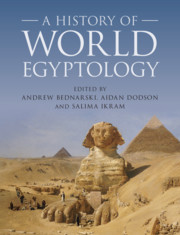Book contents
- A History of World Egyptology
- A History of World Egyptology
- Copyright page
- Dedication
- Contents
- Figures
- Notes on Contributors
- Preface
- A Note on Academic Titles
- Abbreviations and Conventions Used in Text
- Maps
- Introduction
- Chapter 1 The Prehistory of Egyptology
- Chapter 2 Egypt
- Chapter 3 France
- Chapter 4 The British Isles
- Chapter 5 The Netherlands
- Chapter 6 Belgium
- Chapter 7 The Nordic Countries
- Chapter 8 Prussia and Germany
- Chapter 9 The Empire of Austria-Hungary and the Republic of Austria
- Chapter 10 Switzerland
- Chapter 11 Hungary
- Chapter 12 Czechoslovakia
- Chapter 13 Poland
- Chapter 14 Russia
- Chapter 15 Italy
- Chapter 16 Spain
- Chapter 17 United States of America
- Chapter 18 Canada
- Chapter 19 Japan
- Chapter 20 Australasia
- Chapter 21 Ancient Egypt in the Cinema
- Chapter 22 Past and Future
- Bibliography
- Index
Chapter 8 - Prussia and Germany
Published online by Cambridge University Press: 01 June 2021
- A History of World Egyptology
- A History of World Egyptology
- Copyright page
- Dedication
- Contents
- Figures
- Notes on Contributors
- Preface
- A Note on Academic Titles
- Abbreviations and Conventions Used in Text
- Maps
- Introduction
- Chapter 1 The Prehistory of Egyptology
- Chapter 2 Egypt
- Chapter 3 France
- Chapter 4 The British Isles
- Chapter 5 The Netherlands
- Chapter 6 Belgium
- Chapter 7 The Nordic Countries
- Chapter 8 Prussia and Germany
- Chapter 9 The Empire of Austria-Hungary and the Republic of Austria
- Chapter 10 Switzerland
- Chapter 11 Hungary
- Chapter 12 Czechoslovakia
- Chapter 13 Poland
- Chapter 14 Russia
- Chapter 15 Italy
- Chapter 16 Spain
- Chapter 17 United States of America
- Chapter 18 Canada
- Chapter 19 Japan
- Chapter 20 Australasia
- Chapter 21 Ancient Egypt in the Cinema
- Chapter 22 Past and Future
- Bibliography
- Index
Summary
A problem of definition immediately confronts any discussion of the disciplinary history of Egyptology in Germany: what is Germany? Unlike Great Britain and France, which were established fairly early in their histories as centralised nations, Germany was organised as a loose federation of individual states until the late nineteenth century. Moreover, German language and culture were also to be found beyond the borders of the Holy Roman Empire (from the tenth century to 1806) and the North German Confederation (1866–71). Not until the foundation of the German Empire in 1871 did Germany emerge, under Prussian leadership, as a modern state with clearly defined borders. These problems of definition are compounded by the existence of the Austro-Hungarian Empire from 1806 to 1918, a multi-ethnic, but German-dominated, nation, as well as by the loss of German territories to other states in 1919 and 1945, following the country’s defeat in the First and Second World Wars (see Map 2a–d). Thus, dealing with Egyptology in ‘Germany’ can present problems, in so far as the physical and intellectual extent of the region varied.
- Type
- Chapter
- Information
- A History of World Egyptology , pp. 210 - 258Publisher: Cambridge University PressPrint publication year: 2021



